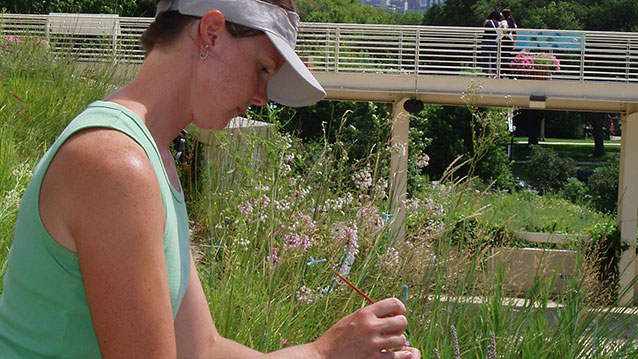EVANSTON, Ill. --- The Shaw family has made a gift of $7.5 million to the Program in Plant Biology and Conservation, a collaboration between Northwestern University and the Chicago Botanic Garden, the University announced today.
The Shaw family gift will fund fellowships for graduate students in the program, which was launched by Northwestern’s Judd A. and Marjorie Weinberg College of Arts and Sciences in 2005 to address a critical shortage of botanists and plant conservationists.
The program offers doctoral and master’s degrees with classes taught on Northwestern’s Evanston campus and at the Chicago Botanic Garden. Students work closely with faculty at both institutions and earn their degree from Northwestern.
Students spend a lot of time in the Daniel F. and Ada L. Rice Plant Conservation Science Center at the Chicago Botanic Garden, which offers nine labs where scientists work on solving plant conservation problems caused by climate change, habitat loss and fragmentation, invasive species and pollution.
“This is a gem of a program -- two premier Chicago-area institutions educating scholars, leaders and practitioners in plant biology, ecology and conservation,” Northwestern Provost Daniel Linzer said. “We are grateful for the Shaw family’s generous support, which will have a significant impact on our students and, in turn, our world.”
The program fosters a collaborative academic and research environment and continues to grow. An internship-based master’s of science degree in land management and conservation for students interested in natural resource management jobs was added this year.
This new track in the master’s program joins the research thesis-based master’s of science degree in plant biology and conservation (the program’s first offering) and the Ph.D. in plant biology and conservation (added in 2009). These latter degrees prepare students for research-based careers, while the internship-based track focuses on training students to be conservation practitioners.
“The Chicago Botanic Garden is proud of its partnership with Northwestern University in plant conservation biology,” said Chicago Botanic Garden President and CEO Sophia Shaw Siskel. “Our master’s and Ph.D students are creating practical land and water management tools and solutions to address environmental challenges, including appropriately managing plant populations and plant and soil communities, especially within human-impacted landscapes.”
“We have trained dozens of talented students over the past several years who are passionate about plant conservation and now are going on to make significant contributions in the Chicago region and beyond,” said Nyree Zerega, director of the Program in Plant Biology and Conservation and a senior lecturer in the Program in Biological Sciences at Weinberg.
“We are delighted the Shaw family is supporting the training of young scientists who will be poised to address some of the world’s most pressing environmental concerns,” she said.
The Shaw family has had active volunteer roles within Northwestern’s Weinberg College of Arts and Sciences and Robert R. McCormick School of Engineering and Applied Science. They have been members of the Chicago Botanic Garden since 1993, and have volunteered in the plant collections documentation area since 2004, in addition to serving in volunteer leadership roles at the Chicago Botanic Garden.
The Program in Plant Biology and Conservation has 40 alumni, with nearly half now in Ph.D. programs at Northwestern and elsewhere. Other program graduates are working in the field, including as a natural resources coordinator for the Illinois Department of Natural Resources, a collections and research assistant at Chicago’s Field Museum of Natural History, an energy analyst at the U.S. Department of Energy and a research technician at the Chicago Botanic Garden.
The program also offers courses and research opportunities for undergraduate students, including those in the plant biology concentration within the biological sciences major in Weinberg and those seeking a combined bachelor’s/master’s degree.


